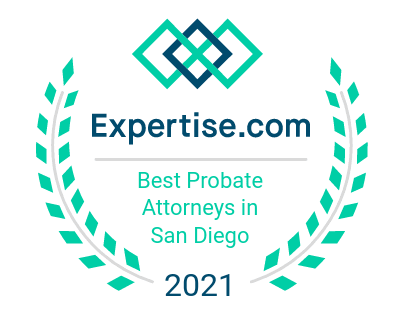Flat Rates, Free Consults
Top San Diego Estate Planning Attorney
Do you know what kind of estate plan may be right for you?
Click the button to the right to take our Estate Planning Quiz Today!

Have You Ever Considered Talking to a San Diego Estate Planning Attorney?
If you’re like most people, your family is the most important thing in your life. Their needs and their comfort will always be of paramount importance. You recognize your role in ensuring their safety and welfare, and that is why you are interested in talking to an estate planning attorney.
Unfortunately, you may have put off making the proper provisions for their future in the event that you are no longer in the picture. This is possibly the worst mistake you could make.
If you fail to plan today for the interests of your loved ones, the courts and California law will certainly do it for you, and the way in which they dispose of your hard-earned assets might well be the opposite of your wishes.
Take our Probate Quiz to find out if your assets will be subject to probate.
Take action, schedule a free phone consult
Average estate plans per year
Years of combined attorney experience
Documents in our complete estate plan
Estate planning attorneys
Clients have paid over our quoted fee
San Diego Estate Planning Price List
Single Revocable Living Trust
Flat Rate Estate Planning Package- Revocable Living Trust*
- Last Will and Testament
- Health Care Power of Attorney (Includes Living Will)
- Financial Power of Attorney
- HIPAA Authorization
- Transfer Deed
- Certificate of Trust
- Assignment of Personal Property
- Personal Property Memorandum
- Funding Memorandum
- Memorial Instructions
- Asset Organizer Folder with all Documents
*Price includes Probate Avoidance Trust. Advanced planning will be quoted after consultation where attorney determines the scope of representation.
*Price includes Probate Avoidance Trust. Advanced planning (including AB trusts) will be quoted after consultation where attorney determines the scope of representation.
Married Revocable Living Trust
Flat Rate Estate Planning Package- Joint Revocable Living Trust*
- Last Will and Testament
- Health Care Power of Attorney (Includes Living Will)
- Financial Power of Attorney
- HIPAA Authorization
- Transfer Deed
- Certificate of Trust
- Assignment of Personal Property
- Personal Property Memorandum
- Funding Memorandum
- Memorial Instructions
- Asset Organizer Folder with all Documents

How Do You Take Payment for Setting up a San Diego Estate Plan?
Generally, we require that half of the payment be made when you decide to hire us and sign our fee agreement. The other half is due on signing. We believe in the importance of estate planning. With that said, we will gladly work with anyone on setting up a payment plan for the cost of your estate plan if you currently are under financial hardship. Please contact us if you have any questions.
Flat Fee San Diego Estate Planning: We Don’t Believe in Billing by the Hour when drafting a San Diego Estate Plan.
Legal fees are often a source of anxiety for families. This anxiety can lead to a delay in putting a San Diego estate plan in place.
In addition, we have found that when the clock is always running, clients can make rash decisions or avoid asking their estate planning lawyer questions.
When we set out to create our estate planning price list we wanted to ensure that our clients knew how much they would be charged, and were able to ask as many questions as needed until they fully understand the plan they are putting into place.
Simple, Flat Fee Estate Planning in San Diego
We feel that a flat fee estate planning price list leads to much better relationships between the attorney and client.
When there is a better relationship, there is a better outcome. Pretty simple right?
San Diego Estate Planning Frequently Asked Questions

San Diego Estate Planning FAQ’s
What is a Revocable Living Trust?
Definition: A Revocable Living Trust (RLT) is one created by the settlor during lifetime, in which, during his lifetime, the settlor retains the absolute right to totally revoke the trust, change its terms to any degree, and/or regain total possession of the property in the trust.
Put simply, it is a agreement where you (the settlor) gets to appoint an agent (the trustee) to control how your property is managed and distributed throughout all phases of your life and death.
Benefits:
- Control over your assets (that you put into the revocable trust) while you are alive and well, if you become incapacitated, and after you pass away.
- Privacy in the handling and administration of your assets during your lifetime and upon your death.
- Reduce estate taxes and legal expenses by planning ahead and being able to avoid the probate process through a private trust administration.
What is a Will or Pour Over Will?
Definition: A Will is a written document which states an individual’s wishes as to how he or she wants his/her property to be disposed of at death. A Will therefore specifies “who gets what”- and is some cases-“who does not”.
A Pour Over Will is the same as a Will, however in a Pour Over Will you make your Trust the beneficiary of all of your assets. When you set up a Trust, you will transfer title of your assets to the name of the Trust, but if there are any assets that were not properly transferred, the Pour Over Will will make sure they are transferred.
Benefits:
- A will is completely revocable (changeable) during someones lifetime, but becomes irrevocable (not able to be changed) at the moment of death.
- You get to control who gets your property upon your death and you get to name who is responsible for carrying out your wishes (Your Executor).
Limitations:
- In California, even if you have a will, your executor will still be subject to having to go through some form of probate. The cost of going through probate will be paid for by your estate.
- Upon your death, your executor (or his/her attorney) will file your will with the probate court, and it then becomes public record. Thus, you lose the benefit of privacy that a Trust provides. This may open up the floodgates for disgruntled family members or creditors to dispute the will. Your estate will have to defend the will and the legal costs will likely be paid from your estate, lowering the amount that you can leave for your beneficiaries.
- Your will only takes effect after you pass away and does not control any property if you become incapacitated.
What is a Durable Power of Attorney?
Definition: A Durable Power of Attorney or Financial Power of Attorney is a written agreement (or document) that enables an individual (referred to as the principal) to designate an other person or persons as his “attorney-in-fact,” that is, to act on the principals behalf for financial matters. In other words, this document grants authority to an agent to act in the place of the principal with relation to finances.
Benefits:
- The scope of the Durable Power of Attorney can be limited (such as “Only to pay my mortgage”) or very broad (“Any and all of the legal powers I have including but not limited to…”)
- “Durable” power of attorney remains in effect during incapacity but terminates upon death.
- You can choose to have your power of attorney take effect immediately or take effect only upon your incapacity or a certain date (referred to as a Springing Power of Attorney).
What is an Advanced Health Care Directive (aka Health Care Power of Attorney)?
Definition: A Health Care Power of Attorney is a written document that enables an individual (referred to as the principal) to designate an other person or persons as his “attorney-in-fact,” that is, to act on the principals behalf for health care decisions.
Benefits:
- You can choose who you would like to make your health care decisions on your behalf if you were to become incapacitated.
- You can make decisions for your end-of-life care, such as the choice to prolong life or not to prolong life.
- You can elect to donate organs or tissues for transplantation or research purposes(or elect not to donate any organs or tissues).
- You can choose to have your power of attorney take effect immediately or take effect only upon your incapacity.
What is a Probate?
Definition of Probate: In its most narrow sense, probate means to prove that the will was the decedent’s , and that the will being offered to the court is the “Last Will” of the decedent. In its broader sense, probate refers to the entire process of administering the decedent’s will, including gathering the decedent’s assets, paying the decedent’s taxes and debts, and distributing the remaining assets to the proper beneficiaries.
Read More: Handling the Probate Process
Benefit:
- You are able to save money while you are alive by not having a trust drafted.
Downside:
- Time: In San Diego there are currently 2 judges that review all of the probate cases and it is not uncommon for a probate case to last from 1-2 years.
- Expense: While you do save money while you are alive, the cost of going through probate generally far outweighs the cost of setting up a living trust.
- Public Records: Probate is a public process and your estate will lose the privilege of privacy.
What is Funding a Revocable Living Trust?
Funding a Trust: Funding of a revocable living trust should occur at the establishment and then again at a later date as assets change over time. It is incredibly important to have a fully funded living trust, because an partially funded (or unfunded) trusts is not able to avoid probate.
In the funding process, you will make ownership changes to the title of most of your assets. You will change the title from your name to the name of your living trust.
It is important to consult with an estate planning attorney to determine exactly what assets should be titled under the trust, and which should be left out of the trust. Here are a list of some assets to consider:
- Cash Accounts
- Investment Accounts
- Stocks and Bonds not held in investment accounts
- Stock Options
- Personal Effects
- Retirement Plan Assets
- 529 Plans ( Qualified Tuition Plans)
- Life Insurance Policies and Annuities
- Notes, Mortgages, and Other Receivables
- Partnership Interests
- Corporate Business or Professional Interests
- Sole Proprietorship Business Interests
- Oil, Gas, and Mineral Interests
- Real Property
As part of the funding process, it is also important to update any applicable beneficiary designations to coordinate with provisions of the revocable trust.
What is the Current Death Tax Rate?
California Death Tax: While tax laws change relatively frequently, there is currently no death tax imposed by the state of California. “For decedents that die on or after January 1, 2005, there is no longer a requirement to file a California Estate Tax Return.”
Federal Death Tax: In 2016, as an individual, if your gross estate is valued under $5,450,000, then you will not owe any estate taxes. If you are married then the $5,450,000 can be multiplied by 2 (for each spouse). This means that a married couple’s estate will not be taxed if it is under $10,900,000. IRS Website.
What is an Executor?
What is an Executor: When a person dies, the law in California requires that his/her property must be accounted for and collected. Once the debts, taxes, and expenses are paid, then the remaining assets are distributed to whoever is legally entitled to that property. That distribution is determined by the person’s will, or if there is no valid will (or to the extent a will is partially invalid), the intestate laws of California.
It is the Executor’s (or sometimes referred to as the administrator’s) responsibility to collect and safeguard the decedent’s assets, pay the death taxes, debts, and expenses of the decedent, and make the appropriate distribution of any remaining assets.
Probate
The entire process by which these tasks are accomplished (with the supervision and guidance of the court system) is called Probate.
What is a Trustee and How Should I Choose One?
Definition of a Trustee: A trustee is the person who has been appointed to manage a trust. In California, a trustee has a legal obligation to care for the trusts assets in the best interest of the beneficiary or the beneficiaries. Some common trustee duties are:
- Managing rental properties
- Investing funds
- Paying income to beneficiaries
- Closing down accounts
- Accounting to beneficiaries.
A trustee should posses business judgment (even if their is no business), honesty, and integrity. The trustee must be able and willing to exercise a high degree of care over trust property and avoid (however tempting) investments or acts that are likely to result in losses.
A trustee must have legal capacity to contract. This precludes the appointment of someone under the age of 18 or an incompetent adult. It is also a good idea to try and find a trustee who is local so that they can handle the day to day business of administering the trust.
Investment skill is usually necessary. Under the “Prudent Person” rule, a trustee will be liable to the beneficiary for losses unless he/she exercises the same care and skill that a person of ordinary prudence would exercise in dealing with his/her own property.
Because a trustee must examine and review the trust periodically, administrative and legal skills and knowledge are important. Accounting must be made to the client and eventually to the other beneficiaries. All parties must be advised accurately on the tax and other legal effects. Provisions in the trust must, from time to time be interpreted.
What is a Beneficiary?
Definition of Beneficiary: A beneficiary is the person who is legally entitled to receive the assets from a trust or a will. A beneficiary can be a person or an organization (such as a charity).
Who Needs an Estate Plan in San Diego?
- Parents who have minor children;
- Blended Families
- Individuals and families who own real estate
- Individuals and families who have digital assets
- Young Adults and Young Families
- If you feel your estate is disorganized
- Business Owners
- If you are interested in protecting your wealth
- Professional Service Providers
What is a Living Will?
What is a Living Will?
A living will is a legally binding document that outlines what you want for your own care, thereby preventing some painful debates between family members concerned about your well-being.
It also designates an individual to make medical decisions for you when you cannot, a power that you can limit if you choose. Creating a living will is an essential component of creating an estate plan.
If you experience a serious illness, you may be unable to tell your doctors what medical treatments you want to receive or refuse. Similarly, as you reach the end of life, many circumstances can limit your ability to communicate your health care preferences. It may be a period of weeks or months during which important choices are made on your behalf.
Forms of a Living Will
In California, a living will usually takes the form of an advance health care directive. According to the California Medical Association, traditional living wills are focused only on the refusal of life-sustaining treatment in the event of incapacity.
The living will was often combined with a power of attorney that authorized a specific individual to make health care decisions.
However, the advance health care directive addresses life-sustaining treatment in any situation. It includes the appointment of an agent, also known as a power of attorney for health care, to make decisions. Individuals can include a range of issues in the directive, such as preferences for palliative and hospice care.
If you made a valid form of a living will prior to July 1, 2000, such as a Natural Death Act Declaration, a Durable Power of Attorney for Health Care Directive to Physicians, these remain in effect until revoked.
When a Living Will is Used?
The authority of a health care agent under an advance care directive comes into effect when your primary physician determines you are unable to make your own medical decisions. You can also choose to have that authority come into effect immediately, an option that should be carefully thought through.
Contents of a Living Will
In addition to naming your health care agent, the advance care directive allows you to name your primary physician, although the latter is optional. Individuals may also direct the use of organs after death, such as for transplant or research purposes.
Some individuals choose to refer to specific medical procedures in their living will. The Mayo Clinic recommends thinking about such things as:
- CPR and other forms of resuscitation;
- Being on a ventilator;
- Tube feeding;
- Dialysis;
- Antibiotic or antiviral medications;
- Pain management and other forms of comfort care.
While you may choose to refuse these procedures completely, you may also want to simply place limits on their use. For example, you may agree to be on a ventilator for a specific period of time.
Since it may be difficult to make these choices without more information about what the procedures entail, it is a good idea to discuss the issue with your physician before finalizing your directive.
Once preferences are established in a living will, a doctor can create a POLST (Physician Orders for Life-Sustaining Treatment).
Most appropriate for those with a serious illness or nearing the end of life, a POLST turns the details of a care directive into treatment orders for medical teams.
Creating a Living Will
The state of California has an Advance Health Care Directive Form for individuals to create a living will. However, it is not necessary to use this form to create a valid directive.
Since some specific issues must be addressed in a directive in order for it to be upheld by a court, it is a good idea to draft the document with a lawyer’s assistance.
You and two witnesses must sign your directive in the presence of a notary or lawyer. The witnesses are, in part, certifying that they not only saw you sign the directive but that you were not under duress while doing so and were of sound mind. Witnesses may not include the health agent named in your living will, nor may they include members of your health care team. A special witness is also required for patients in care facilities.
Apart from the legal requirements, it is good practice to discuss your care directive with family members. Ultimately, your end-of-life preferences are your own, but knowing them in advance can help loved ones deal with the situation with less emotion and conflict.
Choosing a Health Care Agent
In California, there are some restrictions on whom you can name your health care agent. In general, it cannot be your doctor, a member of your care team, or an employee at a care facility where you reside.
You should choose someone whom you trust, is comfortable discussing medical issues, and is well-informed about your wishes. Since agents often have to be a patient advocate in court or in discussion with family members and doctors, they should be able to handle conflict appropriately. For your own peace of mind, confirm your agent supports your preferences and is willing to enforce them.
You should review your living will periodically to make sure it still reflects your wishes. If you remarry or experience a new medical diagnosis, you may want to consider revising the document. At any time before it is invoked, you can update your care directive, including changing your health care agent.
A living will, like all aspects of health care, is of great importance to you and your family members.
It helps to ensure you not only receive the care you want, but that loved ones experience the least possible amount of stress during an already difficult time.
Matthew Odgers exemplifies integrity. Estate planning is something both powerful and delicate, requiring a balance of directness and grace. Matthew has both of these qualities. He is able to ask the necessary questions, while holding his clients up with dignity and respect. His thoughtfulness, thoroughness and approach are phenomenal. I will be working with Matthew for the foreseeable future and will recommend him to anyone I care about for their estate planning needs

Creating a Comprehensive Trust Based California Estate Plan
Benefits of San Diego Estate Planning
Planning for your family’s future is serious business, and it’s something you need to do right. With proper planning you will be able to control and protects assets:
- While you are alive and well;
- Upon Incapacity
- Upon Death

Fortunately, Opelon LLP has a comprehensive estate planning package that addresses all three of these life events. Our standard estate planning package includes:
- Revocable living trust
- Will or pour-over will
- Living will
- Appointment a legal guardian for minor children.
- Durable power of attorney for your finances. (DPOA)
- Health care power of attorney for your health care decisions.
- Initial funding of your trust and funding memorandum
- Personal property memorandum
- Memorial instructions
- Certificate of trust
Regardless of the specific type of instrument you devise, the expert estate-planning attorneys at Opelon LLP will help you do it right.
If you are unable to come into the office to meet with an estate planning attorney please take a look at our Virtual Estate Planning Services.
If you think that estate planning is a tool for the rich or the elderly alone, it’s time to think again. People of any age can benefit from having a game plan.
If you should die suddenly without first setting up a trust or writing a will, then the probate court may distribute your assets for you in accordance with local laws, and they will do this with no regard for what you might have wanted.
Worse, the process could be held up in probate for months or even years, thus forcing those you love to wait much longer to receive their inheritances.
Advanced San Diego Estate Planning for Gifts, Taxes, Charitable Giving and Asset Protection
Opelon LLP also offers more advanced estate planning strategies for individuals and families looking for asset protection or to save money on estate taxes. Here is a list of the some of the more advanced Estate Planning services Opelon LLP can provide:
- Irrevocable Life Insurance Trusts (ILIT)
- Gifting Strategies
- Estate Tax Planning
- Marital Deduction and Bypass Trusts
- Grantor Retained Interest Trusts (GRAT, GRUT, QPRT)
- Tax Basis Irrevocable Trusts
- Family Limited Partnerships
- IRA Trusts
- Asset Protection Trusts
- LLC’s
Don’t Try This on Your Own, Hire an Estate Planning Attorney for your San Diego Estate Plan
Some people make the mistake of thinking that a one-size-fits-all solution will satisfy their needs. In truth, everyone has a unique financial situation, and simplistic solutions will never suit the needs of all. In addition, without the guidance of an experienced estate planning attorney, you might very well make errors that could slow the distribution of your assets or invalidate your document entirely.
Meeting with a San Diego Estate Planning Attorney will help you Understand California Estate Planning Laws
From one state to another, estate-planning regulations are both unique and precise. An expert in the subject can ensure that:
- Your estate planning documents will allow your family to avoid probate.
- Shorten the amount of time in which assets are distributed to your family.
- Avoid unhappy family members or friends from contesting your
wishes. - Keep family harmony during a time of grief.
Only by careful consideration of all the potential traps and roadblocks can you be certain of avoiding complications that can be as frustrating as they are costly and time-consuming.
Let the San Diego Estate Planning Lawyer Experts at Opelon Work for You
Given their thorough familiarity with California’s estate-planning laws, the attorneys at Opelon are in the perfect position to work with all who live in and around the San Diego area.
With our assistance, you can develop an estate plan that ensures your family’s future comfort and safety while keeping the courts well out of the picture.
Call our office today and learn how an estate planning attorney can help.
Your family will be glad you did. We are happy to provide our in home San Diego Estate Planning services to Poway, Rancho Bernardo, Ramona, Carmel Valley, Encinitas, Del Mar, Solana Beach, Cardiff, 4s Ranch, Mira Mesa, Clairemont, Pacific Beach, La Jolla, Escondido, Mission Valley, Vista, San Marcos, Carlsbad, Santee, Lakeside, El Cajon, and North County San Diego.




